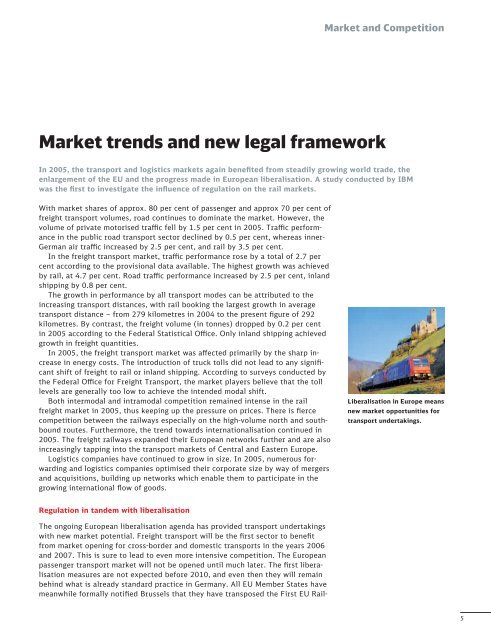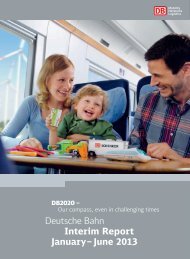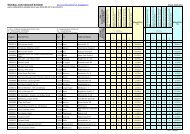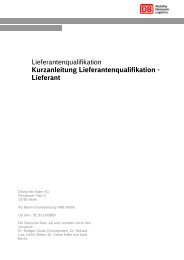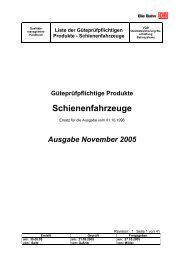Competition Report 2006 - Deutsche Bahn AG
Competition Report 2006 - Deutsche Bahn AG
Competition Report 2006 - Deutsche Bahn AG
You also want an ePaper? Increase the reach of your titles
YUMPU automatically turns print PDFs into web optimized ePapers that Google loves.
With market shares of approx. 80 per cent of passenger and approx 70 per cent of<br />
freight transport volumes, road continues to dominate the market. However, the<br />
volume of private motorised traffi c fell by 1.5 per cent in 2005. Traffi c performance<br />
in the public road transport sector declined by 0.5 per cent, whereas inner-<br />
German air traffi c increased by 2.5 per cent, and rail by 3.5 per cent.<br />
In the freight transport market, traffi c performance rose by a total of 2.7 per<br />
cent according to the provisional data available. The highest growth was achieved<br />
by rail, at 4.7 per cent. Road traffi c performance increased by 2.5 per cent, inland<br />
shipping by 0.8 per cent.<br />
The growth in performance by all transport modes can be attributed to the<br />
increasing transport distances, with rail booking the largest growth in average<br />
transport distance – from 279 kilometres in 2004 to the present fi gure of 292<br />
kilo metres. By contrast, the freight volume (in tonnes) dropped by 0.2 per cent<br />
in 2005 according to the Federal Statistical Offi ce. Only inland shipping achieved<br />
growth in freight quantities.<br />
In 2005, the freight transport market was aff ected primarily by the sharp increase<br />
in energy costs. The introduction of truck tolls did not lead to any signifi -<br />
cant shift of freight to rail or inland shipping. According to surveys conducted by<br />
the Federal Offi ce for Freight Transport, the market players believe that the toll<br />
levels are generally too low to achieve the intended modal shift.<br />
Both intermodal and intramodal competition remained intense in the rail<br />
freight market in 2005, thus keeping up the pressure on prices. There is fi erce<br />
competition between the railways especially on the high-volume north and southbound<br />
routes. Furthermore, the trend towards internationalisation continued in<br />
2005. The freight railways expanded their European networks further and are also<br />
increa singly tapping into the transport markets of Central and Eastern Europe.<br />
Logistics companies have continued to grow in size. In 2005, numerous forwarding<br />
and logistics companies optimised their corporate size by way of mergers<br />
and acquisitions, building up networks which enable them to participate in the<br />
growing international fl ow of goods.<br />
Regulation in tandem with liberalisation<br />
The ongoing European liberalisation agenda has provided transport undertakings<br />
with new market potential. Freight transport will be the fi rst sector to benefi t<br />
from market opening for cross-border and domestic transports in the years <strong>2006</strong><br />
and 2007. This is sure to lead to even more intensive competition. The European<br />
passenger transport market will not be opened until much later. The fi rst liberalisation<br />
measures are not expected before 2010, and even then they will remain<br />
behind what is already standard practice in Germany. All EU Member States have<br />
meanwhile formally notifi ed Brussels that they have transposed the First EU Rail-<br />
Market and <strong>Competition</strong><br />
Market trends and new legal framework<br />
In 2005, the transport and logistics markets again benefi ted from steadily growing world trade, the<br />
enlargement of the EU and the progress made in European liberalisation. A study conducted by IBM<br />
was the fi rst to investigate the infl uence of regulation on the rail markets.<br />
Liberalisation in Europe means<br />
new market opportunities for<br />
transport undertakings.<br />
5


